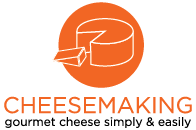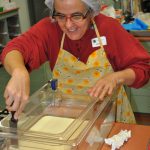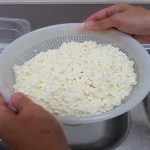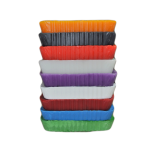With the colder months of the year here you need to keep your newly made cheese warm at night. The basis is that starter cultures continue their fermentation process for several hours after the curd has been placed in the hoop/mould. During these several hours the bacteria will ferment the residual lactose to produce lactic acid and this also helps remove the residual whey/moisture from the cheese. The starter cultures require temperatures of around 25c to continue this fermentation. By leaving cheese that has just been hooped on the bench on a cold day or night you risk ending up with a cheese that is too high in moisture and too low in acid. Therefore when the cheese matures it will not be true to type and may have off flavours and a soft body. The first few hours after hooping are the most critical as this is the time when most of the post hooping fermentation will occur.
A warm environment for your cheese can be achieved in several ways:
- Place your cheese on a tray in an oven with very low residual heat. This may be achieved by turning the oven on for around 20 seconds. Ovens are well insulated and hold the heat in well;
- Keeping cheese in a warm room, if you are warm your cheeses probably is to;
- Placing the cheese beside a container of water that is heated eg a container with a fish tank heater or beside a slow cooker filled with water and cover with a fluffy towel to lock the heat in
- On top of your hot water heater system
Place a container of water beside where the cheese is being kept and measure the water temperature to obtain a guide to the cheese temperature. The cheese should also be covered with a clean damp cloth to prevent it from drying out.



